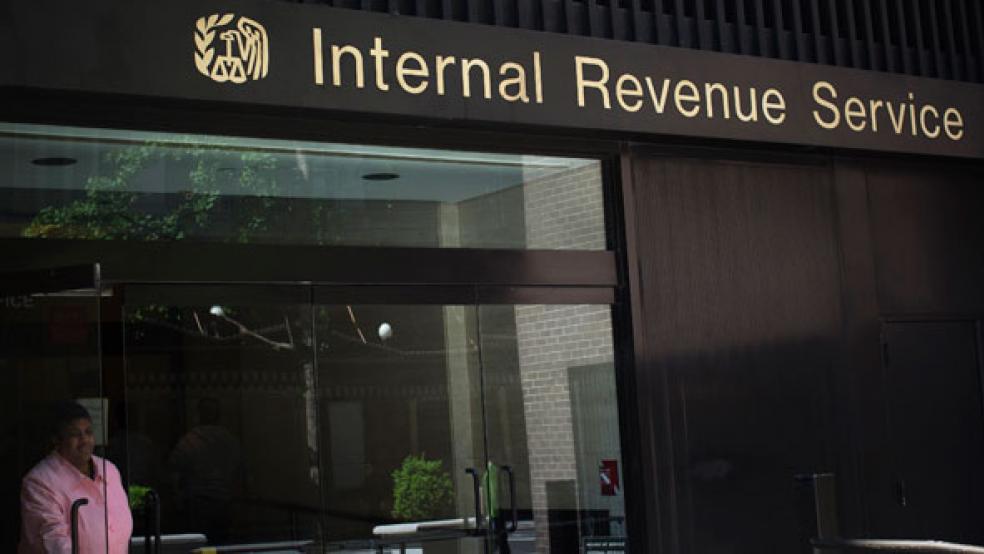There are troubling new findings that could reignite the controversy over the Internal Revenue Service’s targeting of conservative non-profits for extra scrutiny in the year leading up to the 2012 elections. The Government Accountability Office reported this morning that the agency’s office in charge of certifying the tax-exempt status of such groups has such poor controls in place that employees could arbitrarily use political or other criteria to make audit decisions.
The GAO report found that while there are sufficient controls and oversight in some parts of the program, which it refers to as “EO” for Exempt Organizations, “there are several areas where EO's controls were not well designed or implemented. The control deficiencies GAO found increase the risk that EO could select organizations for examination in an unfair manner—for example, based on an organization's religious, educational, political, or other views.”
Related: IRS Admits Targeting Conservatives for Tax Scrutiny in 2012 Election
The finding will confirm the accusations of many Republicans who believe that the IRS deliberately slow-walked or denied requests for tax exempt status from conservative organizations in order to blunt the ability of the Republican Party to get out the vote in the 2012 presidential election.
Furthering the idea that there was a conspiracy at work, the former director of the exempt organizations division, Lois Lerner, not only refused to testify before Congress about the alleged targeting, but also was unable to produce thousands of email messages sent and received during a time period vital to the investigation of the agency’s practices.
Lerner’s computer crashed, was deemed unrecoverable by experts who examined it, and then was destroyed. The internal processes at the IRS for retaining backups of employees’ email correspondence was revealed to be flawed. Investigators were eventually able to retrieve many of Lerner’s emails, but the inability of the IRS to produce a definitive list of emails for the record only served to feed conspiracy theories.
The GAO’s findings won’t do anything to tamp them down, either.
Related: Treasury IG Finds IRS Destroyed More Lerner Emails
Among other things, the GAO found, “Staff could deviate from procedures for some selection processes without executive management approval….[S]taff are not required to obtain executive management approval to deviate from these procedures. This increases the risk of unfair selection of organizations' returns for examination.”
Further, GAO found that there was inadequate supervision by managers at the exempt organizations division. In up to one in three cases where the decision was made not to perform an audit that had been approved, there was no indication that the final decision had been approved by a management-level employee.
Finally, GAO discovered that in many cases, a single person was responsible for making decisions about how to classify certain kinds of applicants. Meaning that all high-profile requests were routed through one individual, all requests from churches through another, and so on.
“Even if other safeguards are in place,” the GAO found, “having the same individual initially classify all political activity or all high profile and church referrals increases the potential for error or unfairness; for example, the classifier could choose not to forward particular kinds of organizations.”
Related: 32,774 ‘Found’ IRS Emails Prompt Criminal Probe
In an opening statement prepared for a hearing on the report this morning, Illinois Republican Peter Roskam, who chairs the House Ways and Means Committee’s Oversight panel, said, “It is disappointing that over two years later, it is still possible that the IRS can select groups for adverse treatment based on their personal political, religious, or educational beliefs. There isn’t proper documentation of allegations or decisions to audit; there are a handful of gatekeepers with sweeping authority and broad discretion; and there is a broken referral committee process.
“The IRS has been entrusted with powerful authority to review and audit organizations, and with that comes a very serious responsibility to the American people,” he continued. “The IRS must acknowledge these problems and take concrete action to ensure a Lois Lerner 2.0 situation cannot happen. This committee will continue to work to reform this broken system and ensure the IRS treats all Americans fairly and equally.”
In response to the GAO, the IRS issued a statement admitting that the investigators had found a “hypothetical risk” of abuse, but claimed investigators “did not find any evidence that this has happened.”





